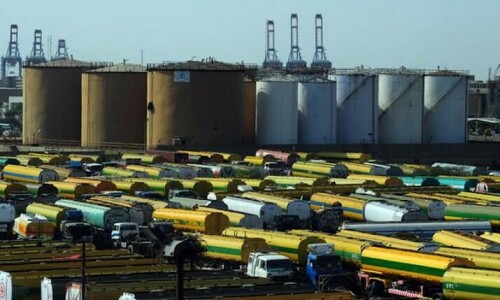THE two worrisome long persisting problems facing the country which can be coupled together are: poor governance and a thriving tax avoidance culture.
In the absence of good governance (prudent spending), the government’s writ (right) to collect taxes has weakened. It is only by linking rights with responsibilities that desired outcomes can be derived and social acceptability of the tax code be advanced.
With weakening welfare aspects of the state, one can see the government gradually vacating space for individual/private philanthropy which is currently at its best at the company and individual levels. Even foreign donors/lenders are diverting money to grassroots organisations which was earlier channelled only through the federal government. On the other hand the tax-to-GDP ratio is at a low ebb despite the questionable withholding tax imposed even on those who do not fall in the category of eligible taxpayers.
With weakening welfare aspects of the state, one can see the government gradually vacating the space for individual/private sector philanthropy which is currently at its best at the company and individual levels
An unfair tax structure is also eroding its social acceptability. The items of mass consumption like petroleum are heavily taxed though they also fuel the economic growth. The right ratio of direct and indirect taxes is needed to raise the government revenues. What is worse is that 65pc of the direct tax revenue is collected through indirect mode (withholding tax). The more the consumers are taxed, the more their purchasing power is eroded and domestic demand is curbed — something which is only feasible if exports are rising and not stagnant as now. The share of WHT is rising at the same time as corporate taxes are being reduced.
However, the good news is that the government has been able to collect a super tax of Rs14bn from rich individuals, banks and other businesses this fiscal year so far.
While the common citizen is concerned about his welfare, the private sector is worried about the ‘enabling’ (including facilitation) environment’ for business. Economic activities and efficiency have suffered for long and are still suffering from want of a critical social and physical infrastructure — the most publicly focused national issue being of energy shortage.
Many companies have set up captive power plants and others are doing so. Businesses are being discouraged to pay taxes by the government’s failure to manage its part of the bargain (facilitate business) while some of the government’s tax incentives and concessions go to a selected few, resulting in the eroding competitiveness of other businesses and vitiating the enabling environment. Cartels, monopolies and oligopolies are a major hurdle in the building of a competitive and efficient economy. The regulatory bodies are toothless.
While the common consumer is heavily taxed (general sales tax is the most rich-yielding ‘levy’ for the government) their social uplift is a low priority (low state spending on educational and health facilities which is also so poor in quality) encouraging the private sector to step in a big way at least for affluent middle class.
Major cities like Karachi also suffer from a shortage of such an essential item as water. The security situation is far from comfortable. Such pitiful conditions cannot — as historical record shows — encourage voluntary tax compliance, what to talk of a new name coined for tax amnesty scheme that rewards the tax evaders and punishes the honest taxpayers. In the last three months, only 6,214 traders have availed themselves of the tax amnesty scheme and deposited a meagre Rs575m in the state treasury before the April 30 deadline. The scheme has proved to be a recipe for a poor tax culture.
The tax structure has no rationale to serve as a magnet for voluntary compliance, and regulatory policies and administrative capacity do not serve as a catalyst to shore up government revenues to the desired level. With the market getting more powerful it has started calling the tune. The only route to correction lies in the building of public pressure to discipline the market in a constructive way. The current policies of the social exclusion would make it increasingly probable if not inevitable.
Published in Dawn, Business & Finance weekly, May 2nd, 2016















































